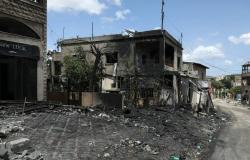Does this prospect spell the final blow for heavy industry? Certainly not, says Gülbahar Tezel from consultancy firm PricewaterhouseCoopers (PwC). ‘But something must be done to prevent Europe from remaining an expensive island.’
The fact that the flow of cheap natural gas from Russia and Groningen dried up quite suddenly was a blow to heavy industry in northwest Europe in particular. Even now that the worst crisis is over, energy prices in this part are still high, partly because liquefied natural gas (LNG) has to be imported from overseas.
About the author
Bard van de Weijer is economics editor of de Volkskrant. He writes about the energy transition and its impact on daily life.
That is why, and because of the climate, Brussels is fully committed to the development of sustainable energy. Solar and wind energy is in principle cheaper than fossil. The idea is that once the transition is complete, industry would also be able to benefit from cheap energy again.
The question is whether this idea is correct, PwC states in a report that will be presented to Energy Minister Rob Jetten (D66) on Wednesday during the World Energy Congress in Rotterdam. Northwestern Europe has less sun and wind than many competing continents, which means that solar panels and wind turbines yield less here. Moreover, there is less space on land. There is room at sea, but offshore wind is more expensive. The energy-intensive European industry may therefore continue to have a cost disadvantage in the future.
Tezel, who heads the energy transition think tank at PwC and wrote the report together with colleague Paul Nillesen, is emphatic about this observation. It is not yet certain whether energy costs will actually remain much higher. “We looked at how they will develop based on what we know now,” she says.
It is always possible that Europe will be able to benefit from the experiences that the continent gains, for example, in the construction of offshore wind farms, making them cheaper in the future.
Import an option
If energy remains more expensive, importing is an option from countries where green energy will soon be produced much cheaper, such as Australia, South America or Africa. Although PwC employees fear that imported green energy will hardly be cheaper, due to the high transport costs.
But there are more flavors: industries here can also import semi-finished products from green energy countries to further process them here. Or entire industries could pack up and move.
The latter option appears to be by far the cheapest: for certain types of chemical products, the costs may be 36 percent lower. However, Tezel does not want to conclude that heavy industry should relocate. Because energy costs are not the only aspect. Europe still has a lot to offer the industry: a highly educated population, good infrastructure, stable governments. Everything that can be summarized under the heading of business climate.
And it is precisely this important component that has also come under fire lately. That is why European policymakers must make an effort to maintain a good business climate, according to PwC.
Smothering industry
To remain competitive in the green future, the Netherlands must now make a choice which industry it wants to have here and which one it may no longer want, says Tezel. And the Netherlands must be careful not to move faster with its climate and energy policy than the rest of Europe, according to the researcher, because we may then stifle our industry.
“If the Netherlands piles its own policy on top of European climate policy, such as an extra CO2 tax, things will become complicated,” she says. ‘You have to be careful when handling the stick. What I am emphatically not saying is: be careful with climate policy. But the Netherlands is too small to run much faster than the rest.’
Martin Scheepers, energy expert at TNO, speaks of an interesting study on a current topic. However, he does say that the emphasis on wind and sun is somewhat one-sided. ‘The industry needs a constant supply of energy. If you want to achieve this with sun and wind, additional energy storage is required, for example. That also costs money.’
Nuclear energy, which according to Tezel was not included in the study due to its high costs, can play a role in this, says Scheepers, because a nuclear power plant supplies a constant amount of energy, even when there is no wind. The same goes for hydropower.
His colleague Martijn de Graaff, who heads the TNO Industrial Transformation programme, sees an emphasis on costs in the PwC study. ‘But the energy system is also about building value chains, where one factory supplies semi-finished products or raw materials to another. If you take one out, such a value chain can be disrupted or even collapse.’
De Graaff: ‘As the PwC report already states: it is really a balancing act.’






